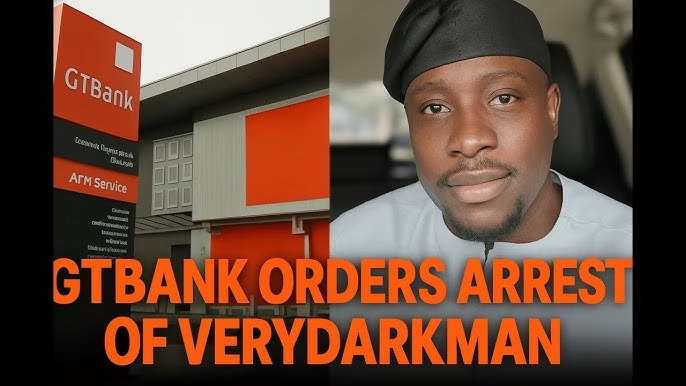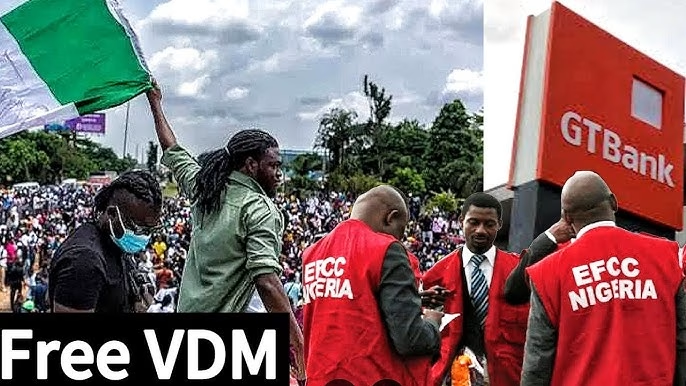
Nigerians Are Done: Massive GTBank Exodus After VeryDarkMan’s Arrest Sparks Outrage
In what was seen as social media content about GT Bank, a shocking turn of events has thrown Nigeria’s digital space into an uproar. Over 100,000 Nigerians have allegedly closed their GTBank accounts following the controversial arrest of outspoken social media activist VeryDarkMan (VDM). And here’s the kicker the arrest happened right inside a GTBank branch, and whispers suggest the bank may have played a role.
Now, Nigerians are asking: Did GTBank just dig its own grave? well, time will tell, and as we serve as a warning to other similar institutions
What Happened?
On May 3rd, 2025, VeryDarkMan famed for his no-holds-barred takes on Nigerian hypocrisy, corruption, and influencer scams was arrested by the EFCC at a GTBank branch in Abuja. According to eyewitness accounts and multiple viral videos circulating on X ( Twitter), the EFCC stormed the premises in what appeared to be a pre-planned operation.
The outrage? Many believe GTBank aided the EFCC by luring VDM into the branch, triggering what critics are calling a corporate ambush. While GTBank has yet to release an official statement, the damage may already be irreversible.
ALSO READ
VeryDarkMan Slammed with Ultimatum
The Backlash Was Immediate and Brutal
Nigerians didn’t wait for confirmation. Within hours, the hashtag #BoycottGTBank began trending on social media. TikTok, Instagram Reels, and Twitter Spaces were flooded with furious commentary, with users accusing GTBank of collaborating with corrupt institutions to silence a voice of the people.
Some users even posted screen recordings of them closing their GTBank accounts live. In less than 48 hours, independent online surveys and financial analysts estimated that over 100,000 customers may have initiated closures or account migration to competitors like other banks and place more value on Opay, Kuda, Moniepoint, and Palmpay.
Why Nigerians Are Not Playing Games

VeryDarkMan’s arrest wasn’t just a legal action it was a symbolic attack on freedom of speech, according to thousands of online voices. For many, it triggered deep-seated resentment towards the increasingly cozy relationship between Nigerian banks and oppressive state forces.
“This is more than VDM,” one user wrote. “It’s a sign that banks can sell you out. GTBank is now officially a risk to personal safety.”
Another influencer declared, “If GTB is complicit in this, then no Nigerian is safe inside that bank. We’ll withdraw our voices and our money!”
GTBank’s Deafening Silence
At the time of publishing, GTBank has neither confirmed nor denied involvement in the arrest. And that silence is costing them dearly. In a country already boiling over with distrust for institutions, silence is guilt in the court of public opinion.
Competitor fintechs have pounced on the opportunity, offering instant migration deals and no-fee transfers to ex-GTBank customers. GTBank, meanwhile, is watching its brand bleed quietly.
What’s Next for Nigerian Banking?
This incident has sparked bigger questions:
- Can we trust Nigerian banks to protect customers?
- Should financial institutions be tools of state oppression?
- Is GTBank’s elite brand now tainted beyond repair?
It’s a PR disaster with long-term implications, not just for GTBank but for the entire Nigerian banking ecosystem. If banks are seen as collaborators in the silencing of truth-tellers, who’s next?

What’s Next NG Thoughts: Did GTBank Just Cancel Itself?
GTBank may have earned billions by building its image as a trusted, tech-forward bank for the modern Nigerian. But in one viral moment with one arrest, it may have lost the very generation it built that image for.
Over 100,000 Nigerians have reportedly closed their GTBank accounts following the controversial arrest of activist VeryDarkMan (VDM) by the EFCC inside a GTBank branch an arrest many believe the bank facilitated. The incident sparked massive online backlash with hashtags like #BoycottGTBank trending and thousands posting proof of account closures. GTBank’s silence has worsened public outrage, with many seeing the bank as complicit in government repression. The event has ignited broader questions about the role of banks in state oppression, threatening GTBank’s reputation and customer trust.
Whether GTBank aided the EFCC or not, perception is reality in the digital age. And right now, the reality for many Nigerians is simple:
GTBank is no longer safe.
What do you think? was GTBank complicit, or just caught in the crossfire? Drop your thoughts in the comments below.





